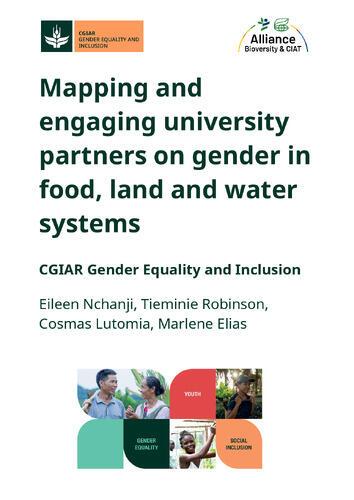
Addressing gender inequalities in food, land and water systems (FLWS) is crucial because these inequalities have a tangible effect on food security, economic development and social equity. The CGIAR Gender Equality and Social Inclusion leads strategic, innovative research to advance gender equality, opportunities for youth, and social inclusion within FLWS. It works with CGIAR Science Programs and Accelerators and external partners, such as universities across the world, to achieve its objectives. Strengthening existing and establishing new partnerships with universities—such as through knowledge exchange, joint research, capacity sharing and policy influence—is critical to generating quality gender research; leveraging global expertise, networks and ongoing initiatives; and achieving desired change in FLWS. This report provides the results of a study in which we mapped and engaged some of CGIAR’s university partners working on gender in FLWS across four regions: Africa, Europe, Asia and Latin America. Engagement was based on availability. The study aimed to determine priority areas for capacity sharing, key themes, methodological challenges and opportunities for interdisciplinary research that address gender dynamics in FLWS. A total of 14 faculty members from 13 universities participated in the study. These institutions comprised four universities from Africa, five in Latin America, four in Asia, and one in Europe. Universities were selected purposively for being longstanding partners of CGIAR in gender research, and because of their demonstrated institutional interest or potential for contributing to gender integration in FLWS research. Data were collected via an online survey featuring open-ended questions, and key informant interviews conducted virtually using Microsoft Teams in 2024. Results show regional variability in integrating gender dimensions in FLWS research across the universities that participated in the study. There is minimal integration of gender in the educational and research programs of the selected African universities. Participant universities in Asia and Latin America demonstrate increasing attention to the systematic integration of gender in academia and research, and the European university that participated in the study had a long history in gender studies and in integrating gender perspective and methodologies into its FLWS research. Aside from the European university, the participating universities face persistent institutional and structural challenges that hinder how gender is integrated in their academic and research programs. Although some of the participant universities in Africa have a dedicated school or center focusing on gender, most do not have dedicated gender-studies departments, and their institutional leadership reportedly shows limited commitment to and prioritization of gender. Similar institutional challenges, such as fragmented leadership commitment and weak departmental mandates for this work, are also reported in Latin American universities, where gender initiatives often rely on individual efforts or external funding rather than being institutionally embedded. In contrast, some Asian universities report more structured gender initiatives, though these too face challenges in curriculum integration and sustainability. Only the European university reported a comprehensive and sustainable institutional framework for gender research and teaching. Across participant universities, there is a shortage of qualified gender experts among staff. Universities are struggling to align traditional academic structures with modern gender-responsive research needs that are critical to research and teaching on FLWS. Institutional challenges are further compounded by funding constraints that limit the development of specialized research initiatives and investments in capacity building for faculty members. This challenge is compounded by limited training of faculty members in gender-responsive methodologies —particularly those in agriculture departments—and constrained capacity to develop competitive proposals that attract adequate and consistent funding for gender research in FLWS. The participants we interviewed considered that strategic partnerships and collaborations—both within and across national boundaries—are critical for addressing existing challenges and advancing gender integration in FLWS. Specifically, participants indicated that collaborations with universities in the global North and with CGIAR Centers have proven essential in facilitating knowledge exchange and increasing research capacity. All participants agree that robust support for students—such as through mentorship, internships, co-supervision arrangements, placements, and sandwich programs (e.g., programs incorporating significant practical work experience or programs undertaken partly abroad)—is critical for nurturing the next generation of gender-focused FLWS researchers. Co-supervision of graduate students, especially through collaborations with gender-focused departments or international research institutions, was noted as an important channel for capacity building. It enables students to incorporate gender perspectives into their FLWS research and fosters institutional learning through shared supervision practices. Across universities, participants consider robust interventions that institutionalize gender research programs at universities in the global South, and capacity building to develop local expertise in gender research, are needed to integrate gender theories and methodologies into academic training, equip faculty members with skills to conduct rigorous gender research, and attract funding to support gender research in FLWS. Existing partnerships and new collaborations among universities, CGIAR Centers, NGOs, local organizations (of farmers, etc.), and government departments can help achieve this. Participants believed that collaborations with CGIAR Centers focusing on gender-responsive FLWS research and curriculum development would provide opportunities to advance gender research and develop a pipeline of gender researchers at the university level.

